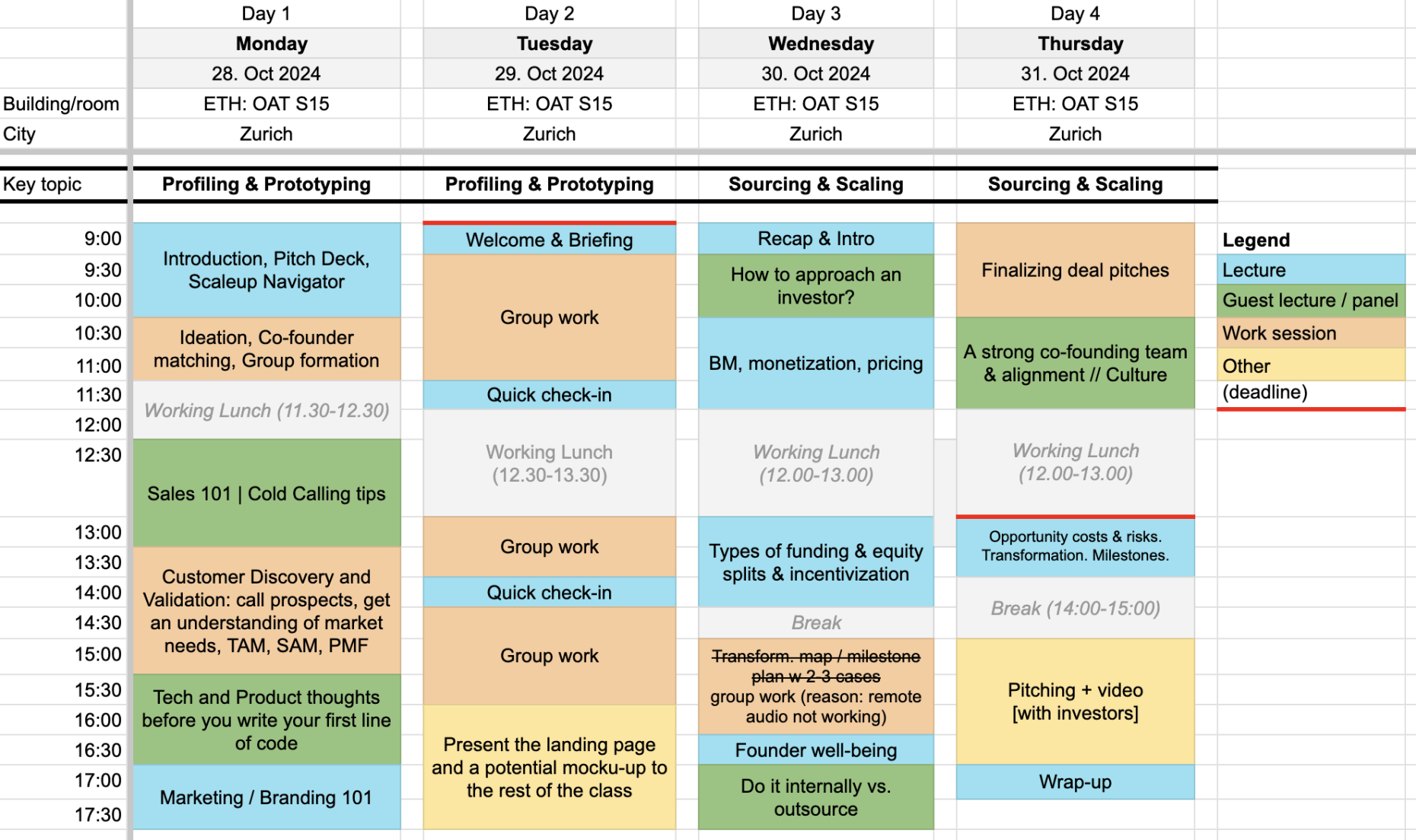Technology and Entrepreneurship
A bootcamp course to learn to identify a problem, construct a team, build a real technology prototype, and validate the business.
Abstract
This course provides theoretical and practical insights into technology entrepreneurship. It focusses on the process of building new ventures from the idea to successfully scaling its business operations. All tasks will lead students to give a complete pitch presentation in front of business experts and investors at the end of the seminar. The course structure will broadly follow the four dimensions of the St.Galler Startup NavigatorTM.
Learning Objectives
Students will develop internationally scalable and technology‑based ventures using the Startup Navigator and ScaleUp Navigator Framework. They will learn how to structure and communicate these ideas to business angel and venture capital investors.
Content
- Profiling (Problem‑Solution‑Fit): Here, students will learn to answer questions such as (1) what is your motivation to start a business? (2) What is the real customer problem? (2) What solution can be identified? (3) Who are the customers? (4) What is the job they need done? etc.
- Prototyping (Product‑Market‑Fit): After this section, students will be able to answer questions such as (1) What is the product or service that solves a customer need? (2) What is the value proposition? (3) What is the unique selling proposition? (4) What is the go‑to market strategy? (5) Who are the competitors? etc.
- Sourcing (Execution‑Fit): Here, students will learn to address questions such as (1) What are important team roles? (2) How to leverage network and partners? (3) What are the requirements to execute the business? (4) Are there any IP‑related challenges? (5) How may we co‑create with others? etc.
- Scaling (Performance‑Fit): In this section, students will reflect their concept in terms of scalability. They will learn to answer questions such as (1) How do we create purpose‑driven culture for growth? (2) How do we scale‑up revenues? (3) How do we optimize our startupʹs valuation in Series‑X funding? (4) What kind of exit options are there?
As a result, students develop internationally scalable and technology‑driven businesses in teams. The special focus lies on the ability to successfully pitch these ventures to business angels or venture capital investors.

Guest speakers & jury members
- Herbert Bay | Earkick
- Lars Mangelsdorf | Yokoy
- Yarden As | ex-Obol & ETH AI Center
- Georges Khneysser | QBIT Capital
- Antonia Albert | Founderful
- Nora Zimmerli | S2S Ventures
- Simon Furer | Voliro
- Viviana Gropengiesser | Talent Kick
- Isabelle Siegrist | Sandborn
Main instructors
Alexander Ilic (Executive Director, ETH AI Center)
Swiss-German deep tech entrepreneur, researcher, and investor. Alex was a professor at University of St.Gallen (HSG), an e-Lab fellow at MIT, has two exits under his belt as entrepreneur (Dacuda, acquired by Magic Leap 2017) and investor (VAY acquired by Nautilus 2021), was named twice "Entrepreneur of the Year" (2011 by HSG, 2012 by EY) and won the Swiss Economic Award. He is passionate about helping talents to find their path to entrepreneurship as chairman of Talent Kick and board member of the student-run S2S Ventures.
Melanie Gabriel (Co-Founder Yokoy, Entrepreneur in Residence ETH AI Center)
Melanie Gabriel, Entrepreneur in Residence and Lecturer at the ETH AI Center, is a founder, board member, and angel investor. She co-founded Yokoy in 2019, a Swiss FinTech & AI company that grew to over 200 employees and raised over USD 107m from top venture capital firms like Sequoia and Balderton. She recently co-founded followthegradient.io to make startup knowledge more accessible. Melanie is a board member of Moodtalk and serves on various advisory boards. She holds a master’s degree in business management from the University of St. Gallen, was inducted into Switzerland’s 100 Digital Shapers Hall of Fame, and received the HSG Founder of the Year Award 2023.